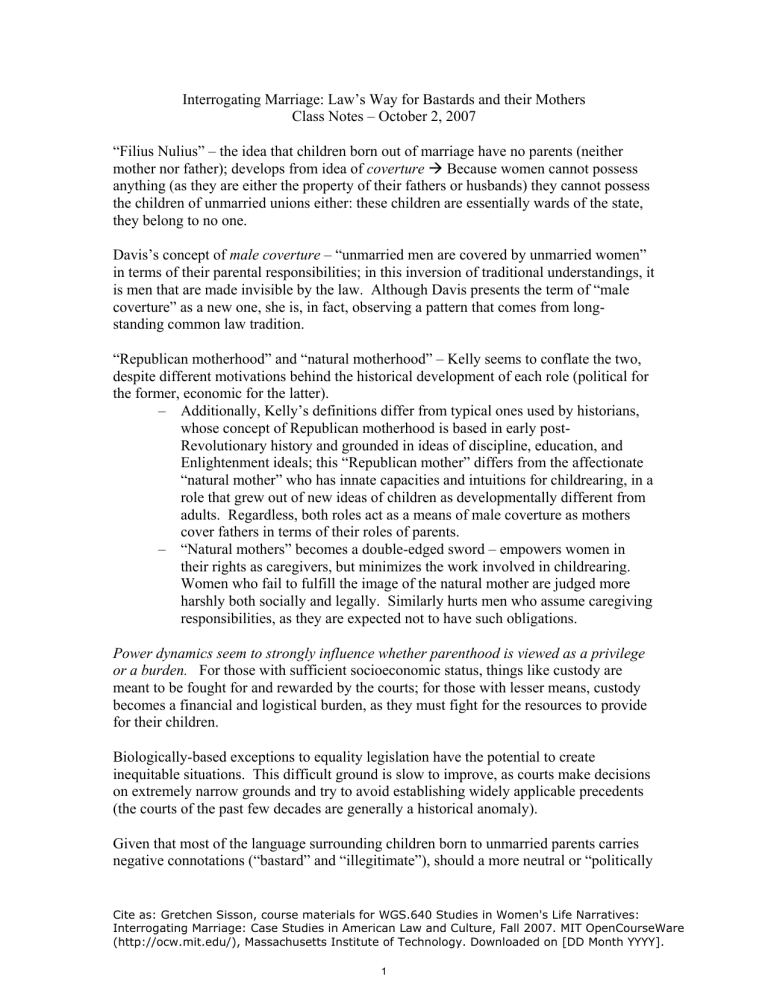Document 13640023

Interrogating Marriage: Law’s Way for Bastards and their Mothers
Class Notes – October 2, 2007
“Filius Nulius” – the idea that children born out of marriage have no parents (neither mother nor father); develops from idea of coverture
Æ
Because women cannot possess anything (as they are either the property of their fathers or husbands) they cannot possess the children of unmarried unions either: these children are essentially wards of the state, they belong to no one.
Davis’s concept of male coverture – “unmarried men are covered by unmarried women” in terms of their parental responsibilities; in this inversion of traditional understandings, it is men that are made invisible by the law. Although Davis presents the term of “male coverture” as a new one, she is, in fact, observing a pattern that comes from longstanding common law tradition.
“Republican motherhood” and “natural motherhood” – Kelly seems to conflate the two, despite different motivations behind the historical development of each role (political for the former, economic for the latter).
– Additionally, Kelly’s definitions differ from typical ones used by historians, whose concept of Republican motherhood is based in early post-
Revolutionary history and grounded in ideas of discipline, education, and
Enlightenment ideals; this “Republican mother” differs from the affectionate
“natural mother” who has innate capacities and intuitions for childrearing, in a role that grew out of new ideas of children as developmentally different from adults. Regardless, both roles act as a means of male coverture as mothers cover fathers in terms of their roles of parents.
– “Natural mothers” becomes a double-edged sword – empowers women in their rights as caregivers, but minimizes the work involved in childrearing.
Women who fail to fulfill the image of the natural mother are judged more harshly both socially and legally. Similarly hurts men who assume caregiving responsibilities, as they are expected not to have such obligations.
Power dynamics seem to strongly influence whether parenthood is viewed as a privilege or a burden. For those with sufficient socioeconomic status, things like custody are meant to be fought for and rewarded by the courts; for those with lesser means, custody becomes a financial and logistical burden, as they must fight for the resources to provide for their children.
Biologically-based exceptions to equality legislation have the potential to create inequitable situations. This difficult ground is slow to improve, as courts make decisions on extremely narrow grounds and try to avoid establishing widely applicable precedents
(the courts of the past few decades are generally a historical anomaly).
Given that most of the language surrounding children born to unmarried parents carries negative connotations (“bastard” and “illegitimate”), should a more neutral or “politically
Cite as: Gretchen Sisson, course materials for WGS.640 Studies in Women's Life Narratives:
Interrogating Marriage: Case Studies in American Law and Culture, Fall 2007. MIT OpenCourseWare
(http://ocw.mit.edu/), Massachusetts Institute of Technology. Downloaded on [DD Month YYYY].
1
correct” language be developed? Possibility that “illegitimate” no longer exists as a social category, and that developing more precise language would only make the difference more salient in the social consciousness, thus creating more inequality where it hopes to alleviate it.
Marriage and the socialist state – if most of the benefits that Americans associate with marriage (i.e., health care) are already universally provided by the government, does this decrease the motivations to marry? This suggestion seems to be a valid one for
Scandinavia, where cohabitation is chosen more frequently than marriage.
Genetics as a means of validating families? Expanding technologies may have the potential to “validate” homosexual marriages but allowing them the same type of genetically related offspring as heterosexual unions; however, this shift might also narrow the definition to families to encompass only those genetically related, or might place a greater burden (particularly legally and financially) on homosexual couples that choose other options. For example: If a lesbian couple can have a genetic child, that might help validate their family more in the minds of some, which could mean progress.
However, if a child could only be listed on the birth certificate as having two mothers if genetically related to both women, then this places a very narrow standard to what comprises a family.
The Moynihan Report – published by the Johnson administration, meant to discuss the state of the family. Ended up focusing primarily on black families, which were described as having “a tangle of pathologies” (i.e. fathers were trying to avoid the responsibilities of having a family, problems with health, women were burdened by having to support fatherless families, etc.) Tremendous backlash (Oscar Lewis, Five Families ; William
Ryan, Blaming the Victim ). Harvard conference on the current status of the family –
Sarah McLanahan’s Fragile Family study showed that 50% of black fathers cohabit with the mother of their children, but as a result of multiple partner childbearing there are still high numbers of single-mother headed families. Questions of cause and effect – Is race or class the more determinative variable? What are the trends for low income white families?
Cite as: Gretchen Sisson, course materials for WGS.640 Studies in Women's Life Narratives:
Interrogating Marriage: Case Studies in American Law and Culture, Fall 2007. MIT OpenCourseWare
(http://ocw.mit.edu/), Massachusetts Institute of Technology. Downloaded on DD Month YYYY].
2
MIT OpenCourseWare http://ocw.mit.edu
WGS.640 Studies in Women's Life Narratives: Interrogating Marriage: Case Studies in American
Law and Culture
Fall 2007
For information about citing these materials or our Terms of Use, visit: http://ocw.mit.edu/terms .

